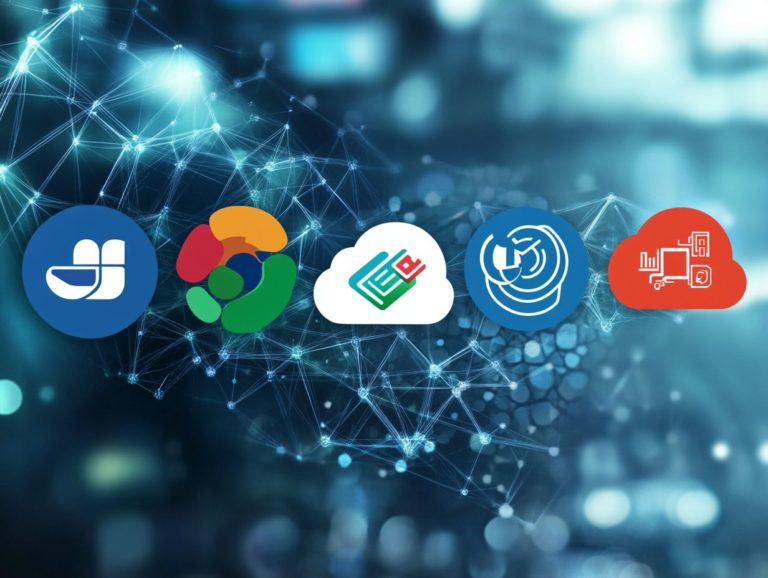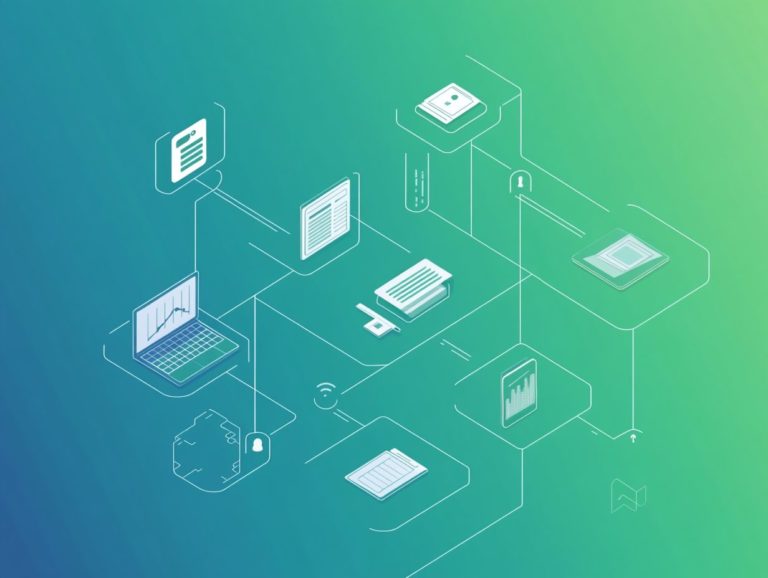5 Popular Programming Languages for PaaS
In today s rapidly changing tech landscape, Platform as a Service (PaaS) helps developers build and manage applications without worrying about the underlying infrastructure. This article delves into five popular programming languages Java, Python, C#, PHP, and JavaScript that play key roles within the PaaS ecosystem.
Each section highlights how these languages enhance PaaS, showcasing their unique advantages and considerations for programmers. Whether you’re a seasoned developer or just starting your coding journey, understanding these languages prepares you to use PaaS to its fullest potential.
Contents
- Key Takeaways:
- 1. Java
- 2. Python
- 3. C#
- 4. PHP
- 5. JavaScript
- What Is PaaS and Why Is It Important for Programmers?
- What Are the Key Features of PaaS?
- How Do Programming Languages Play a Role in PaaS?
- What Are the Advantages of Using Java for PaaS?
- How Can Python Be Used in PaaS Development?
- What Are the Benefits of C# for PaaS?
- Why Is PHP a Popular Choice for Platform as a Service?
- How Does JavaScript Fit into the PaaS Landscape?
- What Are the Limitations of Using These Languages for PaaS?
- What Are the Upcoming Trends in PaaS Development?
- How Can Programmers Choose the Right Language for PaaS?
- What Are the Key Considerations for PaaS Development?
- Frequently Asked Questions
- What are the 5 most popular programming languages for Platform as a Service (PaaS)?
- What is Platform as a Service (PaaS)?
- Why are Java and JavaScript popular programming languages for PaaS?
- Which industry is Python commonly used in for PaaS development?
- Are there any specific features or capabilities that make PHP a popular programming language for PaaS?
- Is Ruby a good choice for PaaS development?
Key Takeaways:
Java, Python, C#, PHP, and JavaScript are popular languages for PaaS development, each offering various advantages. When choosing a language, think about how well it scales, its flexibility, and compatibility. The PaaS landscape is always evolving, so it s crucial to stay updated with emerging trends.
1. Java
Java is one of the most popular programming languages in the world. It s known for its platform independence, object-oriented features, and strong community support. If you’re looking to shine in computer programming, mastering Java is a must!
Since its inception in the mid-1990s, Java has become essential for mobile applications, especially Android development, and robust enterprise solutions. It powers extensive systems across various industries.
The syntax is designed to be approachable for beginners while offering the flexibility that experienced developers appreciate. This combination fosters a smoother learning curve and encourages best practices.
Unlike some languages that prioritize performance over readability, Java strikes a balance, enhancing its appeal across sectors. When compared to C++ or Python, Java offers a unique mix of structure and simplicity, making it vital in areas like web development and large-scale data processing.
2. Python
Python has surged in popularity, especially in artificial intelligence, data analysis, and web applications. Its simple syntax, rich libraries, and active community make it the go-to choice for beginners and experienced programmers aiming for lucrative IT careers.
This language offers remarkable versatility. You can create dynamic web applications with frameworks like Django and Flask, streamlining your development process while boosting efficiency.
For data science, tools like Pandas and NumPy allow you to extract meaningful insights from large datasets, enhancing your decision-making abilities.
Automating tasks is simple with Python, making workflows easier across various industries. Getting a Python certification can skyrocket your job prospects don’t miss out on this opportunity!
3. C#
C# is a versatile programming language developed by Microsoft. It s celebrated for its efficiency in creating web applications, desktop software, and games. Mastering C# is a smart move for anyone eager to enter the IT job market or elevate their coding skills.
Its seamless integration with the .NET framework allows you to develop robust applications efficiently, utilizing a wealth of pre-built functionalities. This makes C# especially advantageous in game development when paired with Unity, a powerful platform for creating immersive experiences.
C# plays a significant role in cloud computing, enabling scalable solutions that meet modern digital demands. As you learn C#, you ll find a supportive community with plenty of forums, tutorials, and documentation to enhance your understanding.
When comparing C# to languages like Java and Python, you ll discover distinct advantages in performance and ease of use, making it an enticing choice for both newcomers and seasoned professionals.
4. PHP
PHP is a powerhouse for web development. It s especially strong in server-side scripting.
Its ease of use, robust database compatibility, and vast array of libraries make it an essential skill for anyone serious about crafting dynamic web applications.
You ll see its versatility shining through in popular content management systems like WordPress. Here, PHP forms the backbone for developing customizable themes and plugins.
In contemporary frameworks like Laravel, PHP elevates efficient application development by streamlining database interactions and simplifying routing.
This thriving ecosystem makes PHP a sought-after skill among developers. Its easy connection with front-end technologies like HTML and CSS enables you to create fully interactive and visually stunning websites that significantly enhance user experience.
5. JavaScript
JavaScript is an essential programming language for web development. It enables you to create dynamic content and interactive features that elevate user experiences across various web applications.
It s no wonder JavaScript is considered a must-learn language for any aspiring programmer.
Its versatility allows you to integrate easily with popular frameworks like React and Vue.js. Both harness JavaScript to build efficient user interfaces that respond fluidly to user interactions.
But JavaScript isn’t just limited to front-end development. With the advent of Node.js, it has established itself as a vital player in backend development as well. This means you can wield a single language across your entire tech stack.
Mastering JavaScript can unlock endless possibilities for your web applications. It enables you to create robust, scalable solutions that meet the demands of users in today s fast-paced digital landscape.
What Is PaaS and Why Is It Important for Programmers?

Platform as a Service (PaaS) is your gateway to a streamlined cloud computing experience. It enables you to build, deploy, and manage applications without the headache of maintaining the underlying infrastructure.
PaaS is an essential tool for developers like you, keen on enhancing your coding skills and optimizing your workflow for various IT roles.
With PaaS, you gain access to an array of tools and frameworks that accelerate application development. Think database management systems, middleware, and integrated development environments all designed to make your life easier.
Unlike Infrastructure as a Service (IaaS), which gives you more control over hardware, or Software as a Service (SaaS), where you simply use software via the internet, PaaS offers a perfect balance. It provides a managed environment for development while taking care of many operational challenges.
This focus on coding allows you and your team to innovate at a quicker pace. You can channel your energy into crafting high-quality code and fine-tuning application performance.
Leading PaaS providers like Google App Engine and Heroku showcase the strength of this model. They dramatically cut down time-to-market for businesses by automating routine tasks and scaling resources as needed.
What Are the Key Features of PaaS?
Key features of Platform as a Service (PaaS) include:
- Automated infrastructure management
- Scalability
- Integrated development tools
- Support for multiple programming languages
This makes PaaS an appealing option for you as a developer, especially if you’re looking to streamline your application development process.
Beyond these essentials, PaaS platforms typically provide robust monitoring capabilities. This enables you to track application performance in real-time, allowing you to swiftly address any issues that arise.
Integrated version control systems within the platform enhance collaborative workflows. This allows your team to work on different aspects of a project simultaneously without missing a beat.
Deployment tools take your productivity to the next level. They offer one-click options to release updates confidently. These advanced features align seamlessly with modern programming languages and frameworks, which demand agility and efficiency.
Ultimately, this enables you to focus more on innovation rather than getting bogged down by operational overhead.
How Do Programming Languages Play a Role in PaaS?
Programming languages are at the heart of Platform as a Service (PaaS). They shape how applications are built, deployed, and maintained in the cloud. This directly influences your choices of tools and frameworks.
In this realm, languages like Python, Java, and JavaScript are particularly significant. For example, Python’s straightforward syntax often leads to quicker deployment and development cycles. This makes it a favored option for startups and data-driven initiatives. Conversely, Java’s robustness and rich library ecosystem provide unmatched scalability for enterprise solutions. Then there’s JavaScript. It dominates web development and ensures smooth integration with various cloud services, ultimately enhancing your collaborative efforts.
As you deliberate on your options, the impact of your language selection becomes clear. It can directly affect the efficiency and flexibility of your applications within the PaaS environment.
What Are the Advantages of Using Java for PaaS?
Java brings a myriad of advantages for your Platform as a Service (PaaS) development journey. It boasts robust performance, extensive libraries, and a strong community backing. It s no wonder that it has become a preferred choice for crafting scalable web applications in cloud environments.
Java’s inherent portability allows you to write applications that run seamlessly across various systems. This enhances your deployment flexibility. Its security features, including built-in access control and a robust garbage collection system, are designed to protect sensitive data and applications in the cloud. This gives you peace of mind.
With powerful frameworks like Spring at your disposal, you can accelerate development and efficiently build enterprise-grade applications.
Real-world giants like Netflix and LinkedIn showcase Java in their PaaS architectures. They deliver reliable and innovative services. Imagine building powerful applications with minimal effort!
This demonstrates how Java can effectively drive successful cloud-based solutions. It reinforces its status as a leading language in the field.
How Can Python Be Used in PaaS Development?
Python s versatility and simplicity position it as an exceptional choice for your Platform as a Service (PaaS) development needs. This powerful language allows you to swiftly build, deploy, and manage applications while harnessing robust frameworks designed specifically for web applications.
Regarding enhancing PaaS, two frameworks stand out: Django and Flask. These frameworks not only streamline your development process but also offer seamless integration with a variety of cloud services.
With Django s robust features and built-in admin interface, you can craft complex applications with impressive speed. Meanwhile, Flask provides the flexibility you require for smaller projects or microservices.
Both frameworks enable you to focus on writing code rather than getting lost in configurations. This facilitates rapid app development. Their ability to deploy applications in cloud environments accelerates your launch process, making it easier for you to scale and manage performance effectively.
What Are the Benefits of C# for PaaS?
C# offers a multitude of advantages for your Platform as a Service (PaaS) development. You ll appreciate its seamless integration with Microsoft Azure. It provides robust type safety and extensive libraries that make building cloud-based applications a breeze.
These features significantly enhance collaboration across various programming languages. C#’s language interoperability allows your teams to leverage existing code and tools effectively.
The asynchronous programming capabilities enable you to create responsive applications. This means your applications can juggle multiple tasks simultaneously, greatly improving performance in enterprise-level environments.
By seamlessly integrating into the broader cloud computing ecosystem, C# enables you to scale your workloads efficiently. This ensures both agility and reliability. This versatility positions it as a top choice for businesses looking to innovate while upholding high standards of quality and security in their applications.
Start evaluating these languages today to elevate your development process!
Why Is PHP a Popular Choice for Platform as a Service?

PHP is a top choice for Platform as a Service (PaaS) due to its simplicity, strong community support, and impressive capabilities for dynamic web applications. Developers are naturally drawn to this language in the cloud environment!
The beauty of PHP lies in its easy integration with databases like MySQL or PostgreSQL, allowing seamless data management. Frameworks such as Laravel provide powerful tools for rapid application development.
This versatility not only reduces development time but also ensures your applications are scalable and maintainable. PHP’s strong presence in content management systems like WordPress and Joomla further cements its importance in creating and managing online content effectively.
Ultimately, this combination of features nurtures an ecosystem that continually attracts developers seeking reliable and effective tools in the PaaS landscape.
How Does JavaScript Fit into the PaaS Landscape?
JavaScript is essential in the Platform as a Service (PaaS) landscape, particularly for front-end development and server-side applications. It enables you to create rich user experiences and dynamic web applications.
Its versatility extends beyond user interfaces; it integrates seamlessly with Node.js, offering a robust environment for backend development. This means you can use a single language for both client and server sides, enhancing efficiency and reducing context-switching.
Using frameworks like React elevates your development capabilities, allowing teams to create sophisticated, responsive applications that excel in cloud environments.
The advantages of JavaScript in a PaaS context include faster development cycles, scalability, and simplified maintenance, making it the go-to choice for modern web development.
What Are the Limitations of Using These Languages for PaaS?
When considering programming languages like Java, Python, C#, PHP, and JavaScript for your Platform as a Service (PaaS) needs, it’s crucial to recognize both their strengths and limitations. For insights into successful implementations, check out these 5 real-world examples of PaaS success. Each language presents unique challenges that can affect your application’s performance and efficiency.
For example, while Java offers great scalability, it can slow you down with heavy resource consumption, leading to longer runtimes. Python is known for its simplicity, but it may cause performance bottlenecks in CPU-intensive applications, requiring careful trade-offs.
C# excels within Microsoft ecosystems, but it may face challenges with cross-platform compatibility.
PHP often receives criticism for inconsistencies in its libraries, making integration somewhat cumbersome. And while JavaScript is incredibly versatile and popular for web applications, managing larger codebases can be tricky due to its dynamic nature.
These factors play a significant role in your decision-making process as you aim to select the most suitable language for your specific PaaS requirements.
What Are the Upcoming Trends in PaaS Development?
Upcoming trends in Platform as a Service (PaaS) development are set to redefine cloud computing. Expect a strong emphasis on automation, multi-cloud strategies, and enhanced integration capabilities, all designed to help you innovate more efficiently!
The rise of serverless computing is likely to transform traditional coding paradigms. This means you can focus just on coding, freeing you from infrastructure management burdens. Such a shift facilitates rapid deployment and scalability, making it easier to incorporate artificial intelligence into your development processes and streamlining operations.
Containerization is becoming essential for improving the portability and consistency of applications across various environments. These trends not only enhance the efficiency of programming languages but also refine the PaaS landscape, ensuring it adapts seamlessly to the dynamic needs of modern enterprises.
How Can Programmers Choose the Right Language for PaaS?
Choosing the right programming language for Platform as a Service (PaaS) development involves carefully considering several factors. These include your project needs, team expertise, and the language features that best fit cloud capabilities. For more insights, check out 5 reasons to consider PaaS for your business.
This decision is crucial as it shapes your development process and affects the long-term viability of your applications in the cloud.
Factors like ease of use are vital. They enable your team to quickly learn new languages, significantly reducing onboarding time. Community support is another essential aspect; it enhances your learning journey and provides invaluable troubleshooting resources.
Performance is also critical since it directly impacts your application’s efficiency and responsiveness.
Make sure your choice is compatible with different PaaS providers. This ensures flexibility and offers a broader range of deployment options.
All these elements can supercharge your project execution and influence your career trajectory in the IT sector, guiding you toward in-demand skills and roles.
What Are the Key Considerations for PaaS Development?
When starting with Platform as a Service (PaaS) development, consider these key factors:
- Understanding the infrastructure
- Assessing scalability needs
- Exploring integration capabilities
- Selecting the right programming languages for your project
These elements are pivotal for the success of any PaaS initiative. For example, choosing the right programming language goes beyond familiarity; it directly affects how effectively your application can use cloud-native features for better performance.
Aligning your development practices with cloud services ensures that your architecture remains flexible and scalable, ready to adapt to changing user demands.
Integration capabilities are also crucial. They facilitate seamless interactions with various external systems, promoting a more versatile application environment.
Each of these considerations deserves your careful attention, as they collectively shape the robustness, sustainability, and overall impact of your PaaS projects.
Frequently Asked Questions

What are the 5 most popular programming languages for Platform as a Service (PaaS)?
The top 5 programming languages for PaaS are Java, JavaScript, Python, PHP, and Ruby.
What is Platform as a Service (PaaS)?
PaaS is a cloud computing model that enables developers to build, run, and manage applications without needing to worry about the underlying infrastructure or hardware.
Why are Java and JavaScript popular programming languages for PaaS?
Java and JavaScript are popular for PaaS because they are widely used in web development and enjoy strong support from PaaS providers. They also offer a broad range of tools and libraries for developers.
Which industry is Python commonly used in for PaaS development?
Python is commonly used in data science and machine learning applications within PaaS development. Its ease of use and powerful libraries make it a popular choice for data-driven projects.
Are there any specific features or capabilities that make PHP a popular programming language for PaaS?
PHP is known for its ability to manage large amounts of traffic and its robust community support. It also has a wide array of frameworks and tools that make it ideal for developing web applications on PaaS.
Is Ruby a good choice for PaaS development?
Yes, Ruby is a popular choice for PaaS development, particularly for web applications. It boasts a clean and easy-to-learn syntax, alongside a strong ecosystem of libraries and frameworks. Ruby is also recognized for its scalability and flexibility.
Explore these languages and discover which one excites you the most for your next PaaS project!






